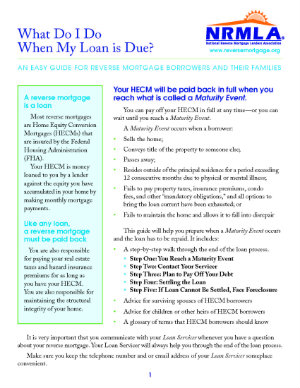The National Reverse Mortgage Lenders Association created, “What Do I Do When My Loan is Due?,” to walk reverse mortgage loan borrowers and their families through the end of the loan process when it is time for the loan to be repaid.
This guide will help your clients prepare when a Maturity Event occurs and the loan has to be repaid.
It includes:
- A step-by-step walk through the end of the loan process.
- Step One: You Reach a Maturity Event
- Step Two: Contact Your Servicer
- Step Three: Plan to Pay Off Your Debt
- Step Four: Settling the Loan
- Step Five: If Loan Cannot Be Settled, Face Foreclosure
- Advice for surviving spouses of HECM borrowers
- Advice for children or other heirs of HECM borrowers
- A glossary of terms that HECM borrowers should know
A Maturity Event occurs when a borrower:
- Sells the home;
- Conveys title of the property to someone else;
- Passes away;
- Resides outside of the principal residence for a period exceeding 12 consecutive months due to physical or mental illness;
- Fails to pay property taxes, insurance premiums, condo fees, and other “mandatory obligations,” and all options to bring the loan current have been exhausted; or
- Fails to maintain the home and allows it to fall into disrepair

